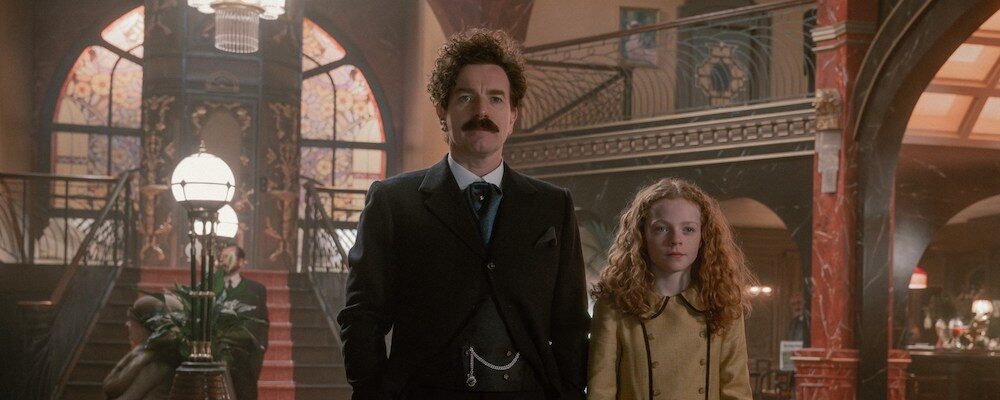In ‘A Gentleman in Moscow,’ Ewan McGregor Gives a Refined Lesson in Resistance
Alci Rengifo
Showtime’s “A Gentleman in Moscow” is a lavish showcase of dramatic restraint. Once again, here is a glossy production where the real heft is in the lead performance. Ewan McGregor gets to play the kind of character we’re meant to sympathize with through his welcoming demeanor, even if he is tragically clueless as to why the world is changing. He is a likable snob. This series arrives with a built-in audience. It’s based on a 2016 novel by Amor Towles which quickly became a staple of many vacationer’s beach reading lists. Like the book, this show functions as a sentimental yarn that easily tugs at the heart strings. For lovers of period pieces strewn with quick historical trivia, it’s a welcoming dinner party.
It is 1921 in Russia and the Bolshevik Revolution has swept away the old order. Count Alexander Rostov (McGregor) has seen his estate burned down and faces a tribunal. By luck, his name appears in a revolutionary poem and so he’s sentenced to house arrest at the Metropol Hotel. At first it seems like an easy deal considering Rostov has been living there already for four years. But he soon discovers the hotel is also a nest of Cheka informants. Lenin’s government figures it’s easier to keep certain aristocrats housed together in order to watch them. There are also lifestyle shifts as Rostov is forced to live in an attic with constant searches monitored by Osip Glebnikov (Johnny Harris). His old friend Mishka (Fehinti Balogun) is also around but is firmly in support of the revolutionary government and its egalitarian aims. As the years pass the count also befriends a young girl, Nina (Alexa Goodall), whose father appears to be linked to the authorities. There’s also romance with an actor, Anna Urbanova (Mary Elizabeth Winstead a.k.a. Mrs. McGregor).
Like the novel, “A Gentleman in Moscow” as a series isn’t meant to be an intellectual drama about the intricacies of the Russian Revolution. There are no passionate discussions on Marxism, class warfare, soviet power versus the dictatorship of the proletariat, etc. The Tsar pulling Russia into World War I, which truly paved the way for revolution, is left out of the picture. Showrunner Ben Vanstone prefers to paint with broad brushstrokes. The message seems to be that change is inevitable but revolution is scary and extreme. If you’re not of the Count’s social class, you might roll your eyes when he bemoans that wine labels have been removed from the cellar’s stock, constituting in his view “cultural vandalism.” At the same time, Rostov is also being forced to humble himself after a lifetime of privilege. His sense of decorum and proper manners seem powerless before a society where now everyone is supposedly equal. Rostov remembers to say “thank you” and eat properly, spouting facts on rare moths, while everyone seems not to care about his vanished world. Of course, he doesn’t seem to realize the revolution erupted out of cruel and profound inequalities.
This dramatic balancing act makes the show quite entertaining. History is complicated and while Rostov’s social class certainly had it coming, there’s no doubt the ensuing regime quickly became authoritarian and cruel in its own way. Just how contradictory the situation can become is evident when Glebnikov asks Rostov for lessons in being a gentleman, in order to understand the more educated faction within the Bolsheviks, led by Leon Trotsky, fighting for power with Joseph Stalin. This is briskly discussed in one or two lines, because what the series is really about are those sweeping moments where Rostov contemplates suicide on the hotel roof, chats about bees with a beekeeper or weeps over the death of his grandmamma. Dreamy flashbacks reveal past memories of his sister and happier times behind gilded walls. Rostov also has enough time to chase after Anna who is busy trying to be a film star, since the Bolsheviks understood early on the power of cinema. Federico Jusid’s weepy violins kick in every time they get alone time in a bar, elevator or bedroom.
Ewan McGregor carries the melodrama forward with enjoyable refinement. He’s like a Russian Frasier Crane with an English accent, likably snobby with some genuinely moving moments when he endures tragedy. As befits the character, it’s also a great example of restraint. McGregor never overplays the role and when he erupts, he quickly bottles it in like someone aware they’ve stepped out of their proper manners. He needs to keep the performance engaging considering he never ages even as the story races through the 1930s and World War II. Must be that fine diet the Count maintains, or simply an odd directorial choice. The supporting roles are all strong as well. Johnny Harris drips real menace hiding an insecure grump. Mary Elizabeth Winstead convinces but is relegated too often to just being the love interest, though this is forgivable in a series that’s more soap opera than prestige production.
Putting aside the history, “A Gentleman in Moscow” also works as a pleasant drama about the passage of time. The older we get, the more the years seem to just slip away. That’s the most effective allegory in the plight of Count Rostov. He becomes a waiter, never loses his manners but watches through the window as everything changes and Nina grows older while participating in great and tragic events of the early Soviet era. The Count also learns the hard lessons of being in love with an aspiring actor who will happily accept a role even if it’s for Stalin. All the while, Rostov gives advice in the style of, “the heart must always be attended to.” It’s not the worst advice. This show has pleasant little nuggets like that thrown around, served with a worthy cast and class.
“A Gentleman in Moscow” begins streaming March 29 with new episodes premiering Fridays on Paramount+ and airs Sundays at 9pm ET on Showtime.

